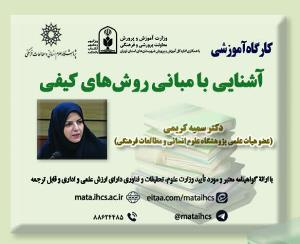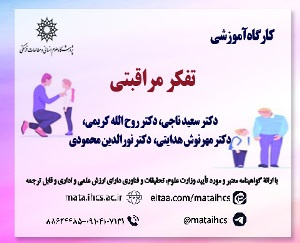اثربخشی زوج درمانی تلفیقی به روش دایمند بر همدلی زناشویی و صمیمیت عاطفی زوجین در سال های ابتدایی تولد فرزند اول (مقاله علمی وزارت علوم)
درجه علمی: نشریه علمی (وزارت علوم)
آرشیو
چکیده
انتقال به دوره ی والدگری غالباً با شور و نشاط و لذت فراوانی همراه است، اما این مرحله تغییرات زیادی را به دنبال دارد که می تواند کارکردهای فردی و زوجی را تحت تاثیر قرار دهد. از یک طرف تولد فرزند نشان دهنده ی تحقق رویای والدین است، از طرف دیگر می تواند به معنای تجربه لحظات دشوار و آزار دهنده ای باشد که در نتیجه تقاضاهای مراقبت و یادگیری بی پایان و سازمان دهی های مجددِ لازم به عنوان یک فرد، همسر، عضو خانواده و حرفه ای (شغلی)، حاصل شده است. از این رو، پژوهش حاضر با هدف بررسی اثربخشی زوج درمانی تلفیقی به روش دایمند بر همدلی زناشویی و صمیمیت عاطفی زوجین در سال های ابتدایی تولد فرزند اول انجام شد. روش پژوهش، نیمه آزمایشی با طرح پیش آزمون، پس آزمون و آزمون پیگیری با گروه کنترل بود. جامعه پژوهش، زوجین در سال های ابتدایی تولد فرزند اول بوده که در سال 1399 به مراکز مشاوره شهرستان بهبهان مراجعه کرده بودند. نمونه پژوهش، 20 زوج بودند که به صورت نمونه گیری در دسترس و بر اساس نقطه برش پرسشنامه رضایت زناشویی کانزاس (شوم و همکاران، 1986) انتخاب و به صورت تصادفی، در دو گروه آزمایش (10 زوج) و کنترل (10 زوج) گمارده شدند. از هر دو گروه، پیش آزمونی برای تعیین وضعیت همدلی زناشویی و صمیمیت عاطفی زوجین به عمل آمد. سپس گروه آزمایشی، طی 6 جلسه 90 دقیقه ای برنامه زوج درمانی تلفیقی به روش دایمند را به صورت زوجی دریافت کردند. پس از گذشت یک ماه و نیم بعد از اتمام درمان، آزمون پیگیری در هر دو گروه اجرا شد. ابزار جمع آوری داده ها شامل پرسشنامه همدلی زناشویی (جولیف و فارینگتون، 2006) و پرسشنامه ارزیابی شخصی صمیمیت (شِیفر و السون، 1981) بود. داده ها با روش تحلیل واریانس آمیخته و آزمون تعقیبی بنفرونی تحلیل شد. نتایج نشان داد که در متغیرهای همدلی زناشویی و صمیمیت عاطفی، افزایش معناداری در نمرات پس آزمون و پیگیری گروه آزمایش رخ داده است. این تفاوت با در نظر گرفتن سطح 05/0 >p معنادار می باشد. با توجه به نتایج به دست آمده می توان نتیجه گرفت که از جمله رویکردهای مؤثر برای کاهش مشکلات و ناهماهنگی های زناشویی ناشی از زایش نخستین فرزند، رویکرد زوج درمانی تلفیقی به روش دایمند است که می توان از این رویکرد به عنوان یک الگوی درمانی و نیز یک الگوی آموزشی به منظور پیشگیری از تعمیق تعارضات و نیز بهبود روابط زوج ها در قالب درمان های زوجی و یا کارگاه های آموزشی بهره گرفتEffectiveness of Integrative Couple Therapy Via Diamond Method on Marital Empathy and Emotional Intimacy of Couples in the Early Years after the Birth of the First Child
The transition to parenthood is often accompanied by much excitement and joy, but this stage involves many changes that can affect individual and couple functions. On the one hand, the birth of a child represents the fulfillment of a parent's dream; and on the other hand, it means experiencing difficult and annoying moments as a result of endless care and learning demands and necessary reorganizations as an individual, spouse, family member, and professional. Therefore, the present study was conducted to investigate the effectiveness of integrative couple therapy via Diamond method on marital empathy and emotional intimacy of in the early years after the birth of the first child. The research method was a semi-experimental design with a pre-test, post-test and follow-up test with a control group. The statistical population of the study included couples couples in the early years after the birth of the first child who visited counseling centers in Behbehan in 2020. From this statistical population, using available sampling method, 20 couples were selected based on the cut point of the Kansas marital satisfaction scale (Shum et al., 1986) and randomly divided into the experiment (10 couples) and the control (10 couples) groups. A pre-test was used to determine the state of marital empathy and emotional intimacy of couples in both groups. Then, the experimental group received integrated couple therapy via Diamond method during 6 sessions of 90 minutes. A month and a half after the completion of the treatment, a follow-up test was performed in both groups. The data collection tool included the marital empathy questionnaire (Joliff and Farrington, 2006) and intimacy personal assessment questionnaire (Shafer and Elson, 1981). Data were analyzed using mixed model analysis of variance and the Benferoni post hoc test. Findings revealed a significant increase in the post-test and follow-up scores of the experimental group regarding marital empathy and emotional intimacy, which was significant considering p







